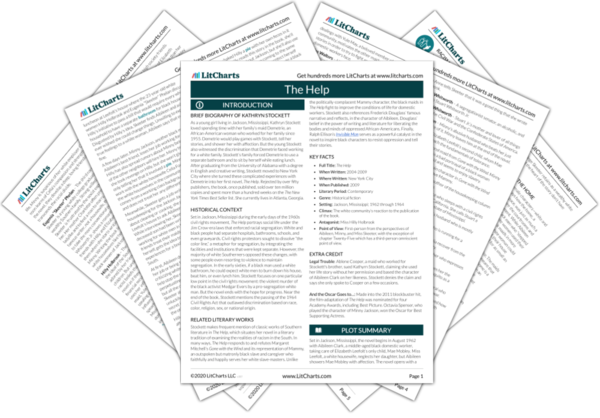The theme of writing is threaded throughout The Help, as the novel melds fact and fiction to showcase the power of storytelling. In an act of defiance against the gender norms of her time, Miss Skeeter seeks self-determination through the act of writing. As a white woman in her society, she would have been expected to maintain the social order, to not “stir up trouble.” Skeeter’s book allows her to pit herself against not only the racist attitudes of her friends but also the limitations imposed on women’s freedom of expression. Since Miss Skeeter is a stand-in for the author, Kathryn Stockett, the novel even suggests that the writing of the book The Help provided Stockett with an opportunity to bridge the racial divides that she witnessed growing up in her Mississippi community.
Intimately related to the theme of writing is the idea of freedom. In the homes, the maids, unable to speak their mind without being fired, often say no more than “Yes, Ma’am.” But Skeeter’s book gives them the chance to record their voices, ones that are undervalued by society, so that the maids might make their mark on history. Their stories do help advance the cause of civil rights, spurring some white women in their neighborhood to educate themselves about race relations and initiate moments of dialogue with their black maids.
The connection between freedom and writing becomes most clear in Minny’s and Aibileen’s narratives. Minny considers the stories as an act of freedom, stories that let her reveal the secret emotions she’s been repressing as a maid. These stories and the truths she reveals unburden her, giving her a psychological freedom she never knew she was missing. Though publication of the book gets Aibileen fired, she finds new employment writing an advice column, which gives her the financial freedom to stop working for racist white families. But more metaphorically, writing provides Aibileen with the freedom to assert her individuality. As a black maid, she cannot express herself publically without fear of white violence, but writing under a pseudonym gives her the freedom to tell the truth of her experiences in her own words. The novel ends with Aibileen thinking about the future, and about the stories she now has the freedom to tell.
Writing, Storytelling, and Freedom ThemeTracker

Writing, Storytelling, and Freedom Quotes in The Help
Taking care a white babies, that’s what I do, along with all the cooking and the cleaning. I done raised seventeen kids in my lifetime. I know how to get them babies to sleep, stop crying, and go in the toilet bowl before they mamas even get out a bed in the morning.

Unlock explanations and citation info for this and every other The Help quote.
Plus so much more...
Get LitCharts A+I put the iron down real slow, feel that bitter seed grow in my chest, the one planted after Treelore died. My face goes hot, my tongue twitchy. I don’t know what to say to her. All I know is, I ain’t saying it. And I know she ain’t saying what she want a say either and it’s a strange thing happening here cause nobody saying nothing and we still managing to have us a conversation.
I wonder if I’ll ever write anything worth anything at all. I turn when I hear Pascagoula’s knock on my door. That’s when the idea comes to me.
No. I couldn’t. That would be... crossing the line.
But the idea won’t go away.
It’s something about that word truth. I’ve been trying to tell white women the truth about working for them since I was fourteen years old…Truth. It feels cool, like water washing over my sticky-hot body. Cooling a heat that’s been burning me up all my life.
Truth, I say inside my head again, just for that feeling.
On my drive home, I want to kick myself. For thinking I could just waltz in and demand answers. For thinking she’d stop feeling like the maid just because we were at her house, because she wasn’t wearing a uniform.
Here’s the thing: I like telling my stories. It feels like I’m doing something about it. When I leave, the concrete in my chest has loosened, melted down so I can breathe for a few days. And I know there are plenty of other “colored” things I could do besides telling my stories or going to....the mass meetings in town, the marches in Birmingham, the voting rallies upstate. But truth is, I don’t care that much about voting. I don’t care about eating at a counter with white people. What I care about is, if in ten years, a white lady will call my girls dirty and accuse them of stealing the silver.
“Why would you want to go stirring up trouble?”
I can tell, in his voice, he sincerely wants an answer from me. But how to explain it? He is a good man, Stuart. As much as I know that what I’ve done is right, I can still understand his confusion and doubt.
“I’m not making trouble, Stuart. The trouble is already here.”
Wasn’t that the point of the book? For women to realize, We are just two people. Not that much separates us. Not nearly as much as I’d thought.
The sun is bright but my eyes is wide open. I stand at the bus stop like I been doing for forty-odd years. In thirty minutes, my whole life’s . . . done. Maybe I ought to keep writing, not just for the paper, but something else, about all the people I know and the things I seen and done. Maybe I ain’t too old to start over, I think and I laugh and cry at the same time at this. Cause just last night I thought I was finished with everthing new.











